Posted on 6/30/2023
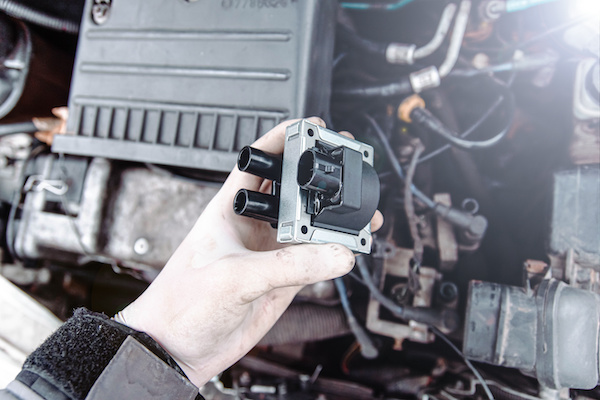
Your car's ignition coil plays a crucial role in starting your vehicle and keeping it running smoothly. This small yet powerful component is responsible for converting the low voltage from your battery into the high voltage needed to ignite the fuel and power the engine. However, like any other part, ignition coils can fail over time. Recognizing these top 5 symptoms of a failing ignition coil is essential for ensuring the longevity and performance of your vehicle. Engine Misfires: One of the most common signs of a failing ignition coil is engine misfires. If you notice your engine sputtering or hesitating during acceleration, it could indicate that the ignition coil is failing to deliver the necessary spark to ignite the fuel mixture in the cylinders. Ignoring this symptom can lead to reduced fuel efficiency and potential damage to other engine components. Difficulty Starting the Engine: A failing ignition coil can make it difficult to start yo ... read more
Posted on 5/30/2023
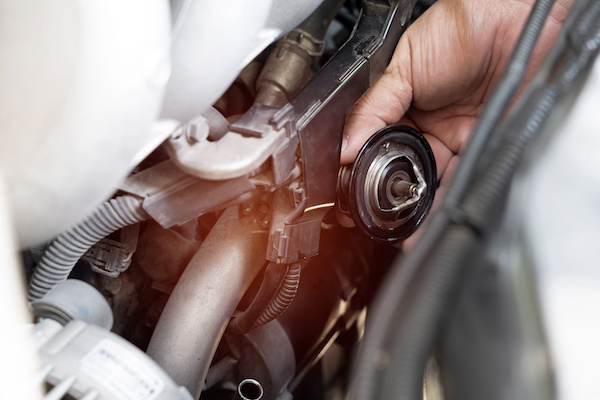
The thermostat in your vehicle's cooling system acts as a gatekeeper, regulating the flow of coolant between the engine and the radiator. Its primary function is to ensure that the engine operates within the ideal temperature range, preventing it from overheating or running too cold. By controlling the coolant flow, the thermostat allows the motor to reach its full potential while running at a stable temperature. That way, you can enjoy your drives and not worry about breakdowns. How Does It Work? When the engine temperature is cold, the thermostat stays closed to prevent coolant from going into the engine. When the engine is too hot, the thermostat opens to let coolant circulate throughout the engine. Over time, the thermostat can fail from staying stuck in one position (open or close). It can also become corroded and damaged with age. Here are some of the keys signs to look out for ... read more
Posted on 4/26/2023
.jpeg)
The cabin air filter is typically made of paper and fibrous materials. It's a rectangular object fixed around the front part of the car. The work of the cabin air filter is to stop contamination such as smoke, dust, dirt, pollen, mold, etc. The contaminants can get in the car cabin during heating, ventilation, and air conditioning (HVAC system). It also keeps the bugs and rodents out of the car. How Do Cabin Air Filter Work? The air entering the cabin passes through the cabin air filter. The filter has papers and fibrous materials that trap the debris and allow clean air to enter the cabin. Eventually, when the debris builds up, the filter is replaced. The driving conditions and the climate determine the filter life. For instance, if you drive on a dusty road, you must change the cabin filter regularly. Other weather conditions, such as the snow, can cause mold buildup, therefore, a shorter cabin air filter lifespan. Benefits of Changing the Cabin Air Filter Numerous benefits ... read more
Posted on 3/30/2023
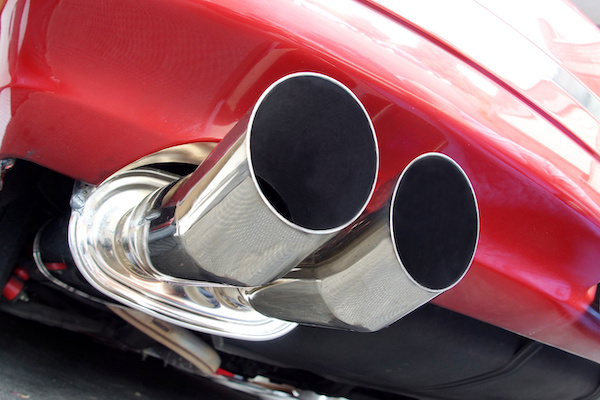
You may have heard of the term muffler at the auto repair shop before, but do you know what it is and why people upgrade them? Let's dive into what a muffler is and its importance in your vehicle's performance. What is a Muffler? A muffler, also known as a silencer, is a component of the automobile's exhaust system that reduces the amount of noise produced by the engine. It is located in the tailpipe and is made up of a series of chambers and tubes that absorb and reflect sound waves. The muffler also plays a critical role in reducing emissions by filtering out harmful pollutants before they are released into the atmosphere. Why Upgrade Your Muffler? There are several reasons why people upgrade their mufflers. Here are some that may motivate you to do so: Improved Performance: Upgrading your muffler can improve your car's performance by increasing horsepower and torque. This is because a less restrictive muffler allows for better airflow, which in ... read more
Posted on 2/27/2023

Traffic is a reality for most drivers, and it can be a significant source of stress and frustration. But staying calm in traffic is crucial for your safety, the safety of others on the road, and your mental well-being. Here are some tips from an auto repair shop on how to stay calm in traffic: Plan Ahead: Knowing the best route to take before you leave can help you avoid traffic and reduce stress. Check traffic reports or use a GPS navigation system to find the best course. If you know that you will be stuck in traffic, consider leaving earlier or later to avoid peak rush hour times. Keep a Safe Distance: Keeping a safe distance between your car and the car in front of you can help you avoid sudden braking or other maneuvers that can cause stress or accidents. Use the three-second rule to maintain a safe following distance. Listen to Soothing Music: Listening to calming music can help reduce stress and anxiety while driving in traffic. Create a playlist of your favorite soothing so ... read more
Posted on 1/26/2023
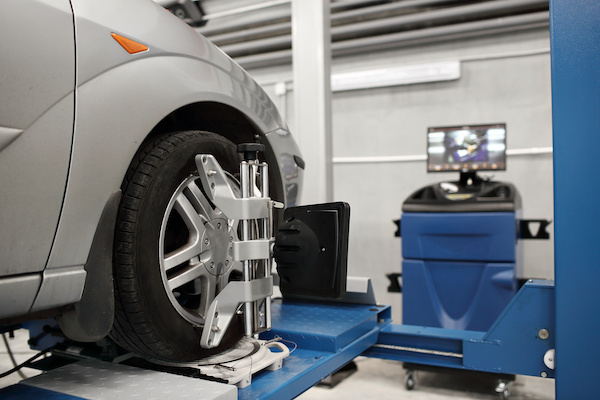
Wheel alignment, also known as tire alignment, ensures your tires perform as they should. This service also corrects your tires to ensure they last longer. It can improve vehicle handling and keep your vehicle running in the direction you want it to go. Therefore, wheel alignments are essential to your safety. What Is a Wheel Alignment A wheel alignment is actually an adjustment of the suspension so that your tires and wheels are parallel and meet the road at the right angle. It is not an adjustment of the tires or wheels like most people think. The angles that the technicians work with are called the camber, caster, and toe. How to Tell If You need a Wheel Alignment There are several red flags that your vehicle may show when your wheel alignment is off. If you catch onto any of the following signs, please bring your vehicle to our shop to have your alignment checked as soon as possible: Uneven tread wear Vehicle veering to the left or right Off-centered steering wheel&nb ... read more
Posted on 12/23/2022

Have you recently noticed your automobile making odd noises out of the blue? Typically, vehicles shouldn't make strange noises unless something is wrong. Most drivers hope that any sudden engine noise changes will go away. Unfortunately, strange engine noise hardly disappears. So, it's best to watch out for the following car noises that need immediate attention. 1. Squealing or Chirping Sound Your vehicle may need immediate attention if it squeals as you accelerate or turn it on. This odd noise may result from loose or old accessory belts for older automobiles. Additionally, squealing noises may come from faulty breaks. It means a lack of enough padding to protect the brakes. 2. Rumbling Rumbling noises are often a result of a hole in your vehicle's muffler. Drive the vehicle to the nearest auto repair shop if you hear these noises to avoid inhaling the leaking fumes. Sometimes the rumbling noises are accompanied by shaking. The cylinder ... read more
Posted on 11/30/2022
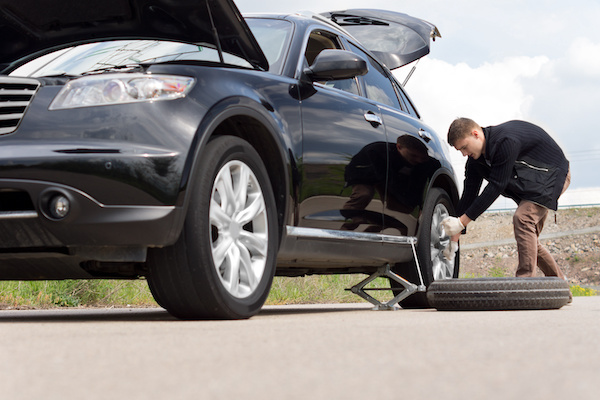
Whether you’re an old or young driver or a new or experienced driver, you should be prepared for any mishaps on the road. One of the most common reasons for automobile breakdowns is a flat tire. Today, we will go over why it is a necessity to learn how to fix or change a flat tire. First, you will need to have a spare tire, that is properly inflated, on hand. Fortunately, all it takes is about 30 minutes of your time to change a flat tire for a spare one. To ensure the removal and installation of these tires go smoothly, you will need the following tools: A Jack A Lugged Wrench Owner’s Manual Gloves (Optional) Reflective Jacket (Optional) And a Spare Tire Step 1: Pull Your Vehicle Over to a Safe Spot To avoid an accident, please pull over to the side of the road or to a safe location for the job. Turn off your car engine, gather your items, and be ready! Step 2: Loosen the Lug Nuts Turn the lug nuts counterclockwise with the wrench. Do not remove them all the way a ... read more
Posted on 10/31/2022

While windshield wipers are simple to understand, it might be harder to predict how long they last — and to know when they need to be repaired. Luckily, there are some clear signs you can look for to determine if you need a windshield wiper replacement. How Long Do Windshield Wipers Last? According to most windshield wiper manufacturers, you should change your windshield wipers every 6 to 12 months. The wipers gradually wear down from use, so you may need to replace them more frequently if you live in a rainy climate. Some mechanics check the condition of windshield wipers during routine maintenance, but if your mechanic doesn't check them, you can generally assume replacing the wipers annually is sufficient. What Are the Symptoms of Bad Windshield Wipers? There are some clear signs you can look for to determine if it's time for a windshield wiper replacement. Streaking. When windshield wipers function optimally, they should leave your entire windshield clean and pr ... read more
Posted on 9/29/2022
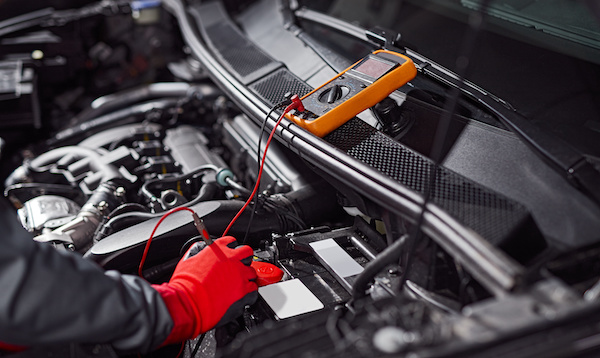
Your car battery is similar to the heart of the body. It needs to beat, or be charged, to provide electricity to start your engine, keep it running, and power your other electrical accessories. If the battery is dead, you can expect nothing to work. Car batteries are just like your other electronic accessories – they weaken and can stop working over time. Most automakers recommend replacing your car battery every 3-5 years. Some batteries can last longer than others. Being able to spot the signs of a failing battery is key to preventing yourself from getting stranded in the future. Let’s take a look at some of the symptoms of a dying vehicle battery. What Are the Signs of a Dying Battery? Batteries don’t usually stop abruptly. It may give off the following indicators before going out: Slow-to-Start Engine: If you notice that it takes a longer time for your engine to turn on, it could mean your battery has weakened. Heavy Corrosion on Terminals ... read more